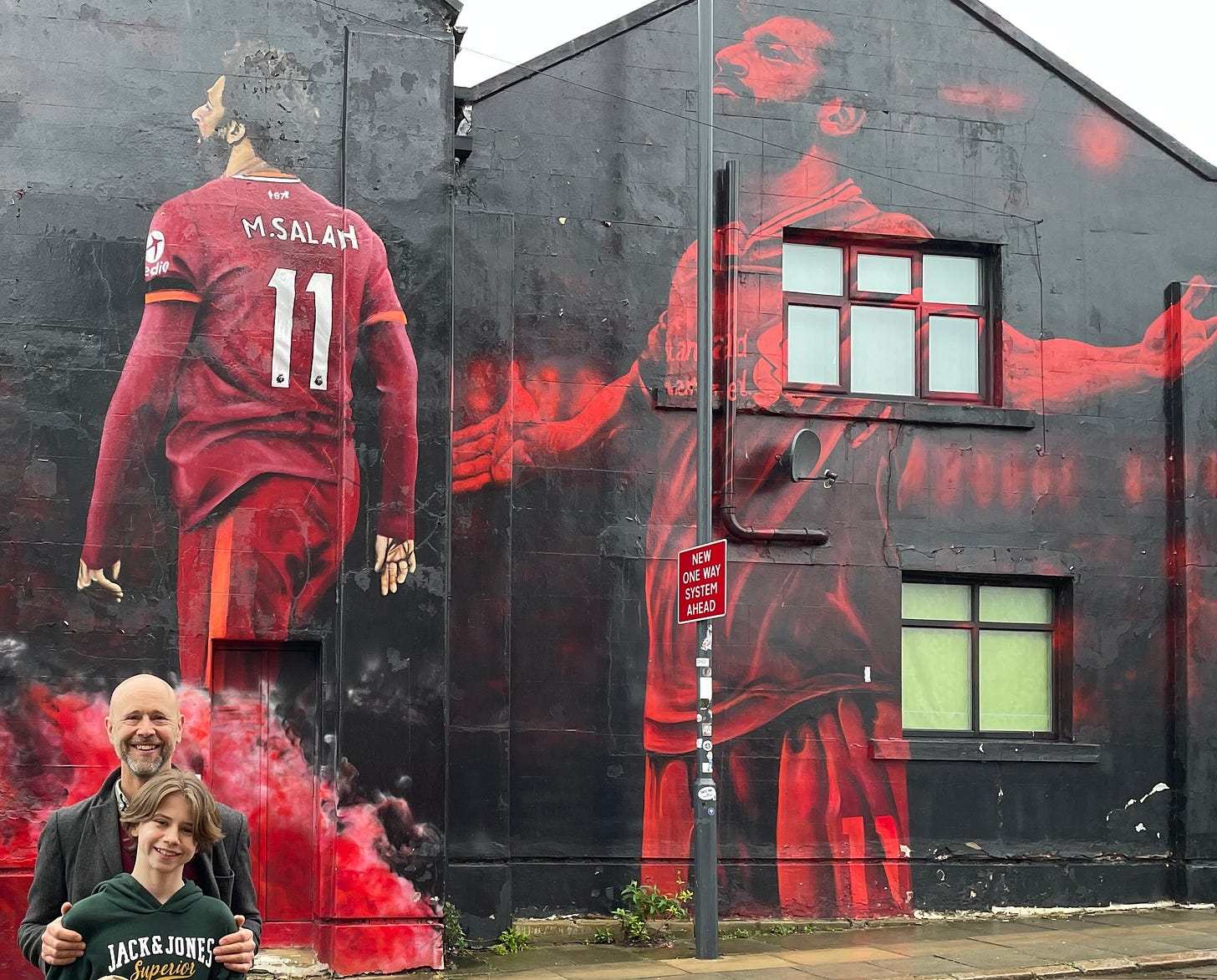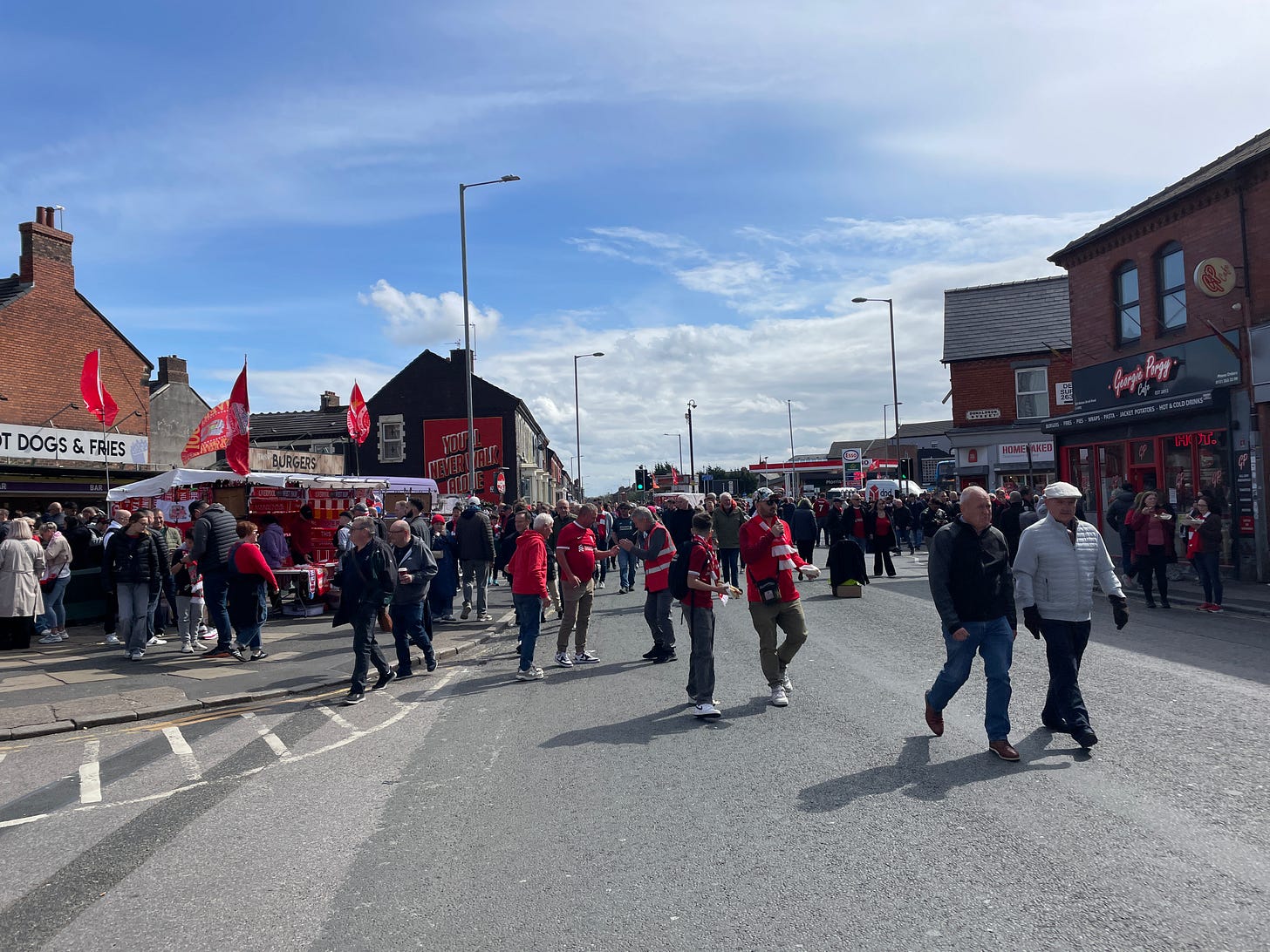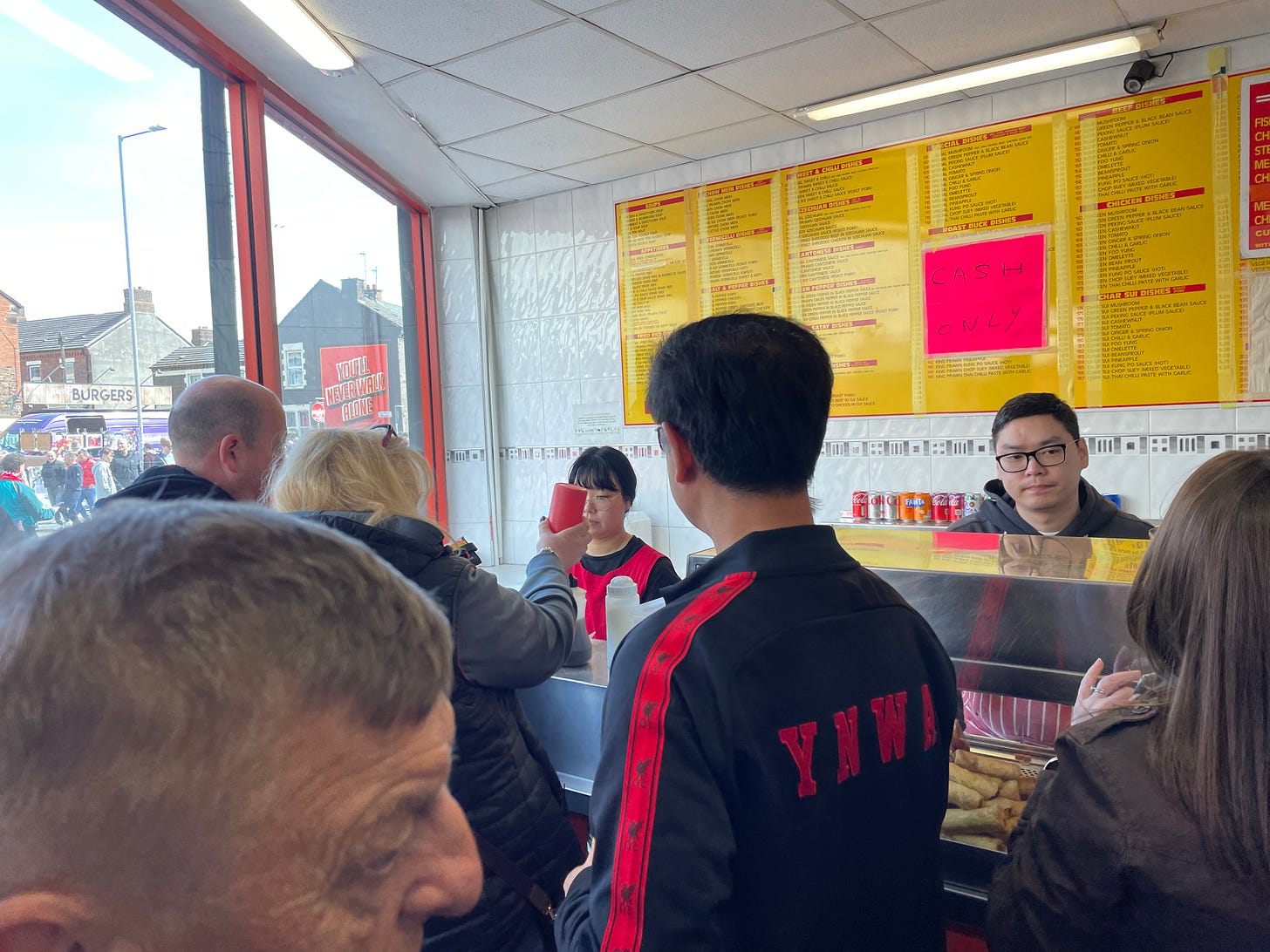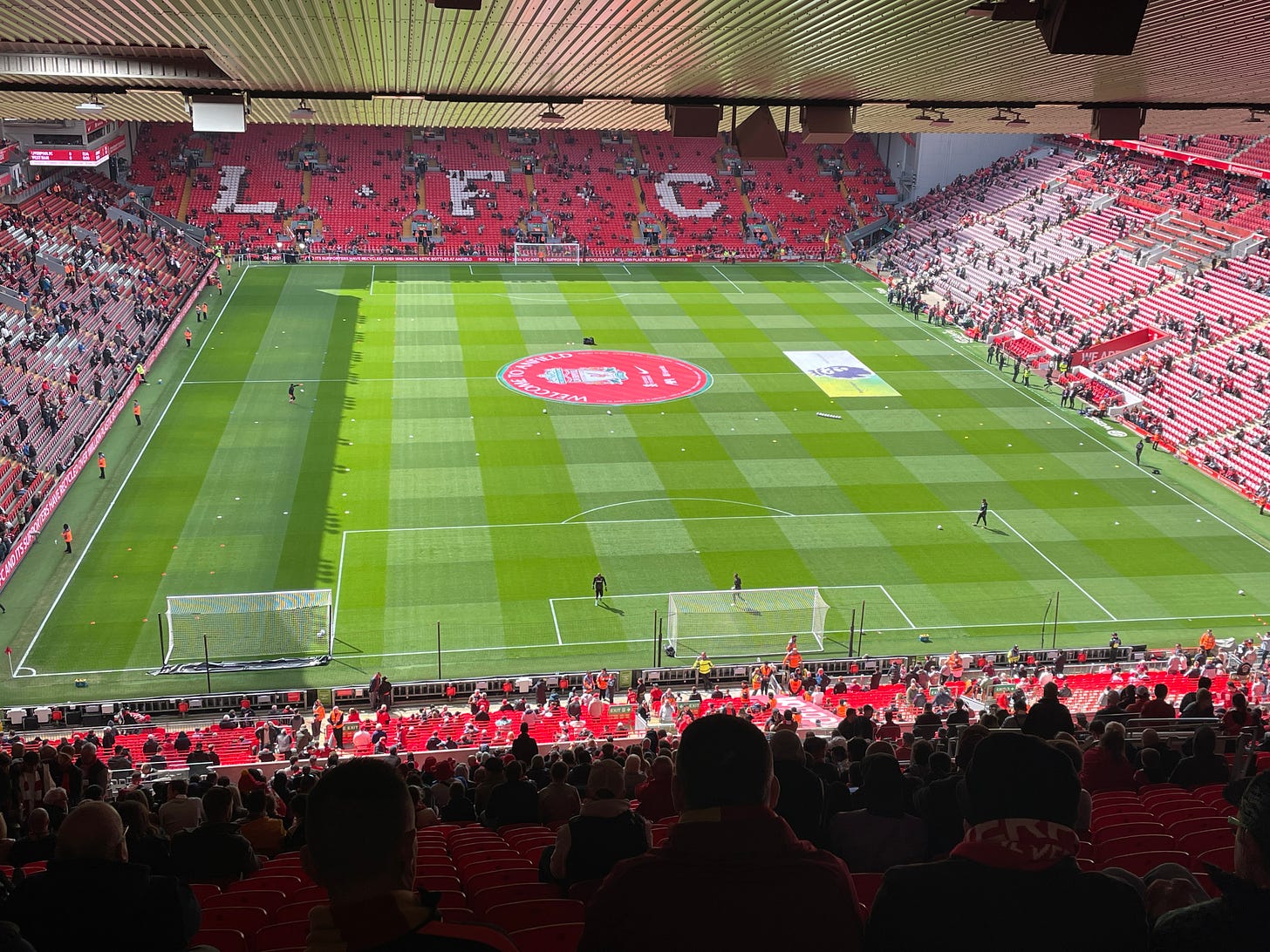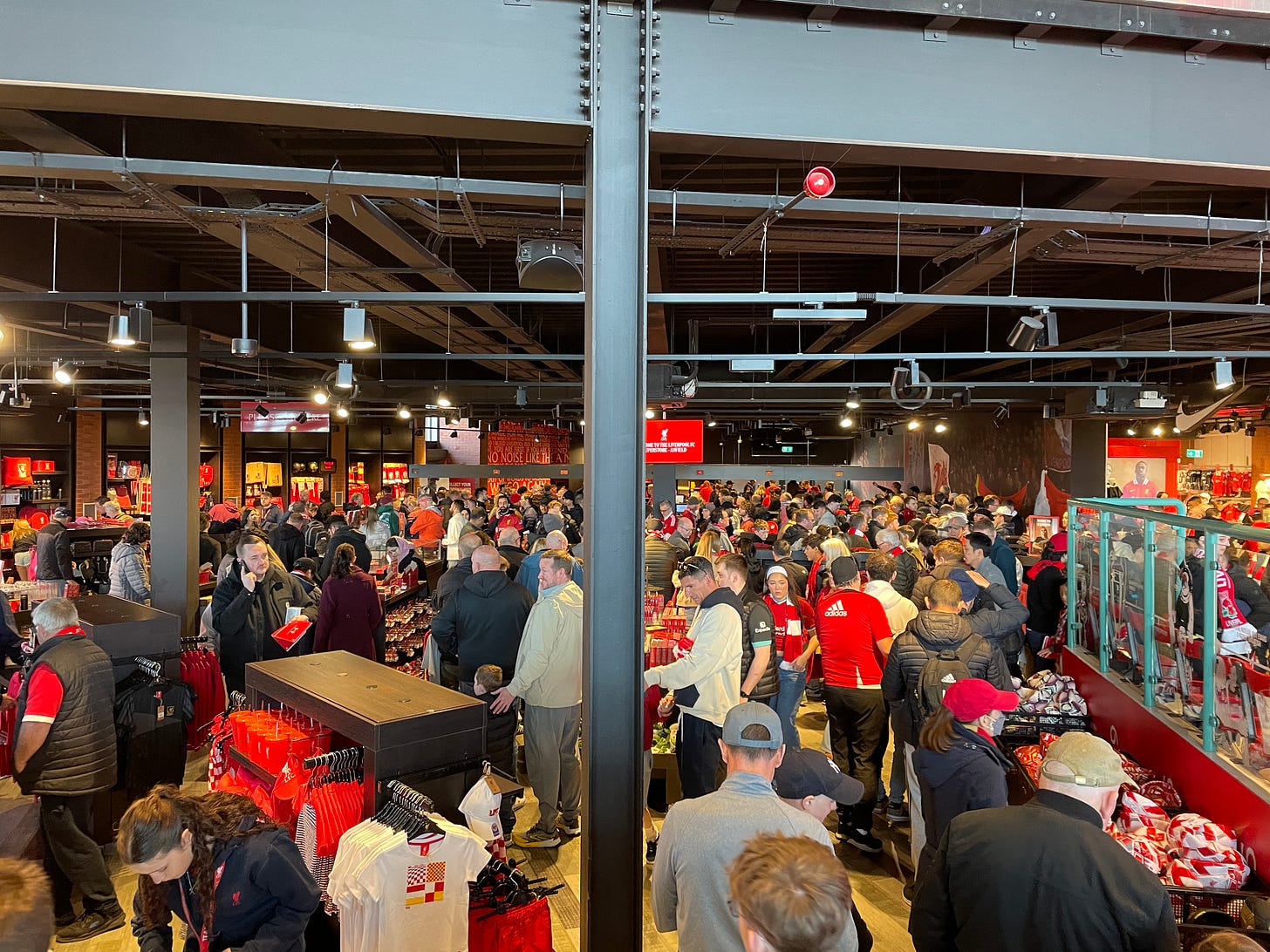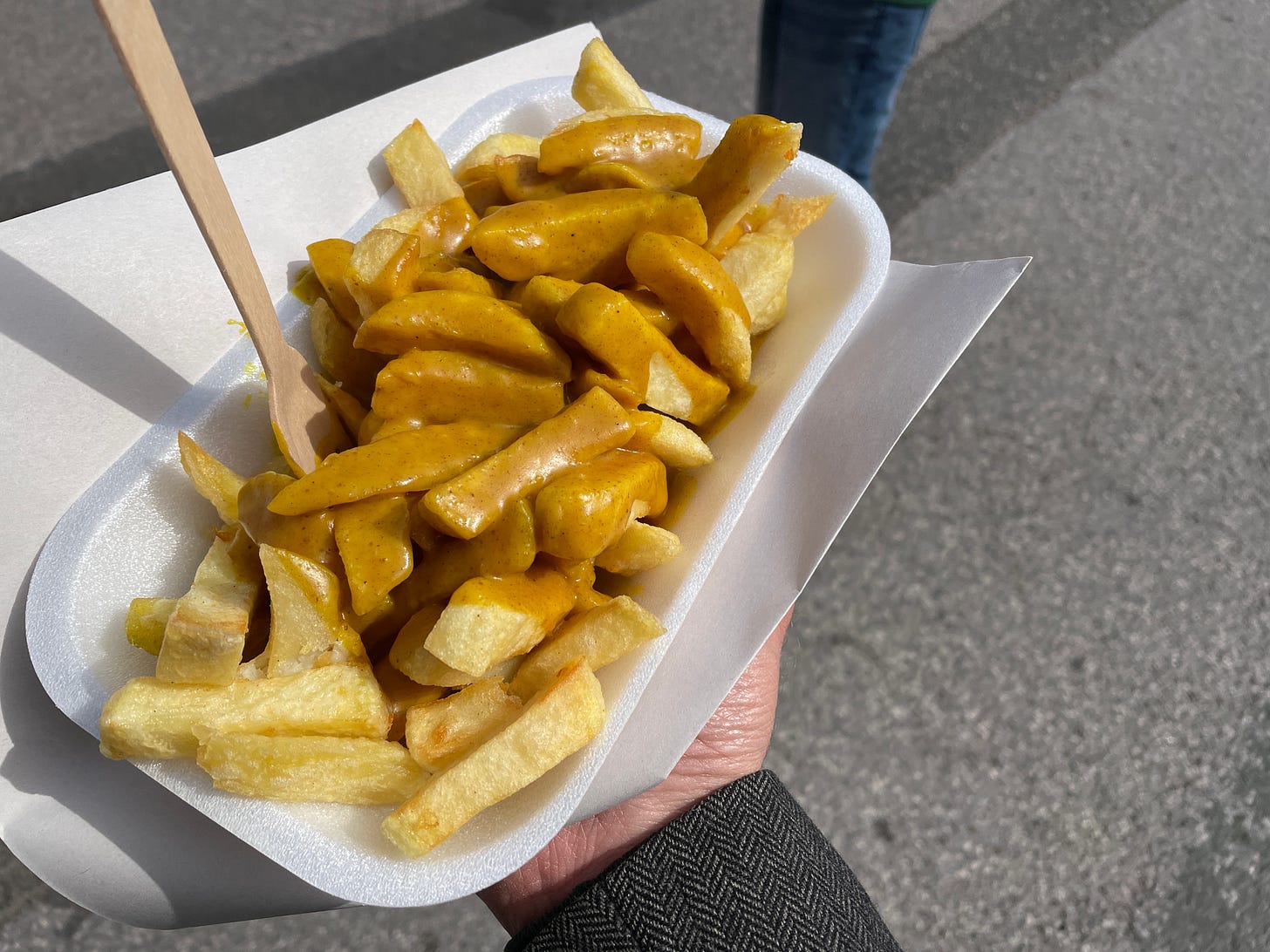Touts, Tourists, and the Ticket Race: How Football, Gigs and Festivals are slipping away from the people who made them matter
Simon Bradshaw
“Wait till you hear the Kop sing…”
I must have told my son that a hundred times before we made the pilgrimage to Anfield together. I’d talked it up for years - the atmosphere, the roar of the crowd, the way the ground seemed to tremble when the team walked out.
We were over the moon to have been lucky enough to secure tickets for the game. It was more than just a match; I used to go on a regular basis, and now I was taking my son for his first visit. There’s something so special about the walk up to the ground, any ground. Something that never loses its power. That sense of occasion, the merchandise stalls with their vast array of scarves, hats and souvenirs, the crowd stopping the traffic as they spill on to the road, the pubs and chip shops rammed full.
There’s such a buzz in the air, the growing anticipation of something massive about to unfold - it always gets me. Whether it’s the distant roar of engines at a Grand Prix, the muffled tones of a warm-up band, or a stadium getting closer, that shared moment before the main event is universal.
So, you can imagine, on the day we finally set foot in the ground together, as we climbed the steps to find our seats and the hallowed turf came into view, glowing almost luminescent - just like it had all those years ago when I saw my first game there - the magic hit instantly. Even though we weren’t off to a great start - we’d just overheard that the immense, exquisitely created and poignant flags that wave majestically in the Kop had been stood down that day, a protest at the rising cost of season tickets. A powerful gesture, but one that immediately dulled the mood. To be honest, the place barely cleared its throat.
Reality Check (Quietly)
We took our seats – me, full of pride and anticipation, my son, wide-eyed in excitement. The whistle blew.
And it was... quiet. Not silent. But subdued. More like a hotel restaurant at breakfast time than an elite match at a sold-out Anfield. A few bursts of “Allez Allez Allez” echoed now and then, but many of our fellow supporters sat silently, some seemingly more interested in filming the spectacle than being part of it.
It felt more like a football-themed experience than the raucous, spine-tingling atmosphere at the ground I’d hyped up for years. I glanced at my son. He looked back at me - puzzled, but still optimistic for the ninety minutes that lay ahead.
The Beautiful Game: Does It Sound Like This Now?
It’s not just me turning into a grumpy old man, though. There’s something bigger going on here. Football, like festivals and gigs, has become more commercial, more curated, more sterile, and frankly, less passionate. Yes, the concourses are roomier, there are frothy oat lattes (although Bovril is still available), and toilets now almost adequate in number – but comfort has a cost.
When tickets are priced for tourists and corporate guests, not die-hard locals or football-crazy kids, something fundamental gets lost.
Anfield used to be a place where local voices carried, where the atmosphere came from the soul of the people in the stands. To a degree it still does, but now, if it’s not a derby, or a European semi-final, often feels more like a stop on the global tourist bucket list, at risk of turning into a footballing theme park. It’s an experience now, rather than a fixture - and that shift is everywhere, from concerts to comedy to festivals.
I get it. Clubs - and performers - need revenue to stay at the top. Stadiums are expensive. Players command eye-watering wages. Football is big business, just like music. But when you're charging £400 for a hospitality ticket that includes a pre-match meal, a chat and a selfie with an Anfield Legend, don’t be surprised when that guest isn't belting out chants for ninety minutes. Especially if they’ve just flown in.
And yet, for many, this is the only way they can see their team. These tickets, perhaps unsurprisingly, are the last to sell out, or the seats remain empty.
This Isn’t Just a Football Thing
This isn’t just a football thing. The same pressures are showing up across live music too. Take Billie Eilish’s ‘Hit Me Hard and Soft’ tour – with average face-value seats upwards of £145. Or Taylor Swift’s ‘Eras’ tour, where the average standard entry starts north of £150. And that’s before resale, where prices can double, triple - or climb as high as someone’s willing to pay.
The cost isn’t just down to superstar salaries. Rising production expenses, inflation, staffing, and the recently implemented higher National Insurance contributions all add up. And with artists like Coldplay opting for multi-night residencies at venues like Wembley instead of traditional tours, fans from Scotland or the North of England now face extra travel and accommodation costs just to attend a single show. This results in fans shouldering more travel and accommodation costs, effort, and inconvenience than ever, reducing the burden on the performer and their production team. Some people, genuine fans, are simply unable to travel from one end of the country to another, to see their favourite band.
It’s not far off what a football supporter goes through to catch a midweek game in Seville, or a Sunday fixture in Southampton or Sunderland. The barriers are rising everywhere - and the result is the same: atmosphere, the real kind, is under threat from all sides.
Atmosphere for Sale
There’s scant post-COVID data available, but a 2019 VisitBritain report showed that 60% of football tourists from the USA bought match tickets before booking flights or hotels. Experiencing the atmosphere was a huge draw, with 70% of Americans citing it as a reason for going to watch Premier League football (VisitBritain, 2021).
The same report states that international visitors who attended football matches in the UK spent an average of £909 in 2019, which is 31% more than the typical inbound tourist (£696), and stayed 10 nights – three nights longer than average. This extended stay and higher spending create a strong multiplier effect, benefiting accommodation, dining, transport, and local attractions. Football tourism clearly plays a critical economic role, just like other major events – driving added value across multiple sectors of the UK economy (VisitBritain, 2021).
The Real Issue: Ticket Prices and Touts?
In football and live events, the resale market is chaotic. Bots snap up tickets in seconds, only to resell at quadruple the price.
The Digital Economy Act (2017) outlawed ticket-buying bots, and the Digital Markets, Competition and Consumers Act (2024) aimed to tighten things further. A fresh consultation, Putting Fans First, is due in 2025, specifically targeting resale fairness (House of Commons Library, 2025).
The clubs are taking some action too. Liverpool recently blocked 100,000 fake accounts and issued lifetime bans to touts (Liverpool FC, 2024). A bold move - but it’s only the beginning, and it’s still ongoing. A 2024 Guardian report estimates that touts cost UK music fans £145m annually. The O2 arena reportedly fended off 50,000 bot attacks in just six weeks. And in 2023, Arsenal said it had blocked another 100,000 suspected bots.
So clearly, the system isn’t working. And while it stays broken, the genuine supporters - and fans of all kinds, get priced out. And with them, the noise.
Prawn Sandwich Brigade?
When Roy Keane made his infamous “prawn sandwich brigade” comment in 2000 (“Keano” was critical of the lack of vocal support from some fans in Manchester United’ Champions League group game against Dynamo Kyiv), he knew where things were heading. And now? We’re there." Seats once held by the faithful are increasingly filled by corporate guests and casual visitors - many of whom have no bond to the club, don’t chant, and don’t live and breathe it.
I first got an inkling of this about the same time as Keane’s comments, when I tried to buy tickets at the Liverpool FC ticket office, only to be told that they were available via telephone sales only, to make it “fair for our international supporters”. Incredulous, I stood on the other side of the glass, on my mobile, only to be told I was number thirty-seven in the queue! And then again, in 2005, when Liverpool, against the odds, progressed to the final of the Champions League. By the quarter-final and semi-final, tickets that were allocated to fans that had been to previous games became ‘limited’, and it was only after a letter of complaint that reached higher echelons that this was addressed.
When lifelong fans are priced out, and tickets are scooped up by resellers, tour companies or corporate hospitality, before they even go on sale to local punters, the authenticity starts to slip away. And, as much as I hate to say it, that’s exactly how Anfield felt on that day.
Fans: The Lifeblood of Football (and beyond)
Here’s the thing: the real fans - the ones who are there no matter what, who’ve been there through thick and thin, are the lifeblood of football. And not just football. The same is true for festivals, music and all sports events. If organisations want to maintain their authenticity, they need to make sure that these people aren’t priced out of the experience.
Iconic Liverpool Manager Bill Shankly once said; “If you can't support us when we lose or draw, don't support us when we win”. If a football club falls down the leagues, it’s these fans who will keep showing up. Tourists? They may keep the tills ringing in the gift shop for now, but it’s unlikely they’ll stick around if the team is no longer in the Premier League. Or when the star player for a club leaves. Will the tens of thousands of South Korean Tottenham fans keep attending games after the departure of their countryman Son Heung-min?
1.5 million people visited the UK to watch live football in the year before the pandemic - a 66% increase from 2011. These visitors spent a total of £1.4 billion, up 84% from the previous study. Football was the most popular live sport for international tourists, with 94,000 business, (or ‘bleisure’) travellers also attending matches.
This report revealed that Anfield drew 213,000 visits in 2019, generating £152 million - second only to Old Trafford, with 226,000 visits, generating £225 million (VisitBritain, 2019, cited in Premier League, 2021).
But clubs and promoters alike need to remember who built this culture, this must-see spectacle. Price tickets sensibly. Prioritise long-time supporters. Crack down harder on touts. Bring the experience back to those who make it real.
Because getting the atmosphere back won’t come from banning bots alone. It will take listening - and putting the right people first.
What next?
We’ll be back next week - same stadium, same team, and hopefully a goal or five resulting in proper limbs! I want my son and all the young, wide-eyed fans to experience that camaraderie, that feeling of communal electricity, that togetherness that makes the hairs stand up on the back of your neck. Here’s hoping the ground sings again, the tourists put their phones down (me included!), and the real fans take back what’s theirs.
But the clubs need to step up too. The real supporters, the locals and ex-pats who’ve stood by them for years, they need to be at the heart of football again. If the clubs don’t listen to them, the beautiful game might just become something else entirely.
But I’m hoping, when we return, it will feel just like it did all those years ago.
I’ll let you know how it goes…
PS:
OK, we went - and it was brilliant! The atmosphere was electric, and my son was ecstatic. I was still surprised by how many non-Liverpool accents we heard around us - a real shift from the matchday crowds I remember years ago. Maybe it was just where we were sitting, maybe like us, they'd travelled some distance, or maybe it's just a reflection on Liverpool's ever increasing cosmopolitan demographic. But it didn't matter, the passion was all there. The fans around us gave it everything. We all did.
That’s the strange beauty of football - and live events more broadly. No two games, concerts or performances are ever the same. A change in weather, a different starting eleven, the bounce of the ball, the mood of the performers, the seat you’re in, or the energy in the crowd - it all shifts. And crucially, the relationship between team and fans is reciprocal. The players feed off the noise, the belief, the rhythm of the stands - and in return, the fans are lifted by moments of brilliance on the pitch. The atmosphere is co-created, not just delivered.
This game, perhaps, came with higher stakes - the team were close to winning the league, and the manager had appealed to the crowd for a “derby” atmosphere for every remaining fixture. You could feel that request echoed in the air. It was louder, more intense, and rawer. But maybe it just can’t be like that every time. Maybe not every match can carry the weight of a title run, just as not every performance is a headline festival slot.
I’ve got huge respect for the fans who attend week-in, week -out, and those who travel the length and breadth of the country, or even Europe, to support their club. In some ways, that kind of effort is now being mirrored by music fans too - travelling hundreds of miles to catch a Coldplay residency at Wembley because there’s no closer option. The scale, effort and wallet of what it takes to be a fan - of anything, has grown.
Last summer’s frenzy around Oasis tickets demonstrates this. Millions tried to grab a seat, with those who got through online, caught up in the fear and panic of losing the opportunity, willing to pay whatever was asked. Some of these had probably not even been around in the band’s heyday. But does it matter? Maybe. Maybe not. The real issue is that we’re all being hyped into believing this is a once-in-a-lifetime experience. To be able to say, “I was there.” The fear of missing out is a powerful magnet, even for non-fans. But it often pushes out the ones who’ve been there from the start.
Atmosphere isn’t automatic - not at football, not at gigs, not anywhere. It’s built, it’s shared, and it’s earned. The best of it still exists - and when it clicks, it’s unforgettable.
And that’s why we keep coming back.
References
BBC Sport (2023) Premier League: Ticket touting a 'significant and rising' problem. 31 January. Available at: https://www.bbc.co.uk/sport/football/64497260 (Accessed: 1 May 2025).
The Guardian (2024) Ticket touts cost UK music fans £6.7m for O2 arena gigs. 25 September. Available at: https://www.theguardian.com/money/2024/sep/25/ticket-touts-cost-uk-music-fans-o2 (Accessed: 1 May 2025).
Liverpool FC (2024) ‘LFC shuts down almost 100,000 fake accounts and issues lifetime bans to combat ticket touting’. Available at: https://www.liverpoolfc.com/news/lfc-shuts-down-almost-100000-fake-accounts-and-issues-lifetime-bans-combat-ticket-touting (Accessed: 23 April 2025).
Premier League (2021) ‘Premier League a huge draw for international tourism’. Available at: https://www.premierleague.com/news/2297798 (Accessed: 23 April 2025).
VisitBritain (2021) Football Tourism in the UK. Available at: https://www.visitbritain.org/research-insights/football (Accessed: 23 April 2025).
House of Commons Library (2025) Digital Markets, Competition and Consumers Bill. Available at: https://researchbriefings.files.parliament.uk/documents/SN04715/SN04715.pdf (Accessed: 23 April 2025).




